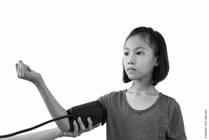Search Results
Viewing: 3901-3910 of 11817 | All

Blog
Problem Solving: How to Teach Young Children
Problem solving is a very important skill that we need to teach children from a young age. A child with problem-solving skills keep going until they find a solution; they’re creative thinkers and can adapt better in a variety of settings.

Blog
Prune Belly Syndrome: 5 Things to Know
Prune belly syndrome is a rare birth defect. It affects the urinary tract, genitals and abdominal wall. Babies are born with it.

Blog
Teaching School-Life Balance to Children
Teaching balance to children from an early age provides them with a skill they will use their entire life, to make a better, happier life for themselves. Not only does this prepare them for adulthood, but it also teaches them skills they can apply right now.

Blog
Are You Worried About Your Child's Height?
Short stature, or shorter height, is a common reason for a visit to a pediatric endocrinologist, a specialist in growth and hormones, but it does not always mean that there is an underlying health concern.

Blog
Parent-Child Attachment: Hidden Opportunities in Everyday Routines
Babies need to feel nurtured and safe in order to thrive and they are able to do this best when they have a secure attachment with their parent. Opportunities to bond with babies and young children are hidden in everyday activities!

Blog
Pediatric Hypertension: High Blood Pressure Can Happen Earlier Than You Think
Hypertension is the medical term for high blood pressure. The blood pressure is created when the heart pumps the blood throughout the body. Hypertension needs to be diagnosed early and managed properly to prevent the development of permanent heart, kidney, and other organ issues.

Blog
Got ADHD Medication? What Parents Need to Know About the Shortage
After already having experienced infant formula, children’s pain reliever, antibiotics, and flu medication shortages, pediatric care providers and families are now struggling with the challenge of shortages of medications prescribed for the treatment of Attention Deficit Hyperactivity Disorder.

Blog
Is Your Co-Parenting Relationship Healthy?
Co-parenting can be a difficult process, but it is possible to have a healthy co-parenting relationship. Here are some signs of a co-parenting relationship that supports a safe and loving environment for a child.

Blog
Front-Facing Car Seats: Is Your Child Ready?
Why is it important to keep your child rear facing as long as possible? Carrie Rhodes, Passenger Safety Program Coordinator at Nationwide Children’s Hospital answers this question and provides recommendations on how to determine if your child is ready for a front-facing car seat.

Blog
Certified Child Life Specialists: Providing Emotionally Safe Care
As developmental experts and “emotional first responders,” a Child Life Specialist’s main goal is to minimize potential trauma and stress experienced during a medical encounter.
